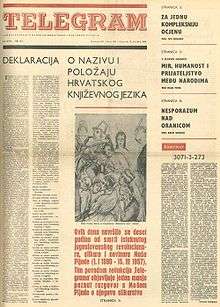Declaration on the Status and Name of the Croatian Literary Language
| Declaration on the Status and Name of the Croatian Literary Language | |
|---|---|
 The Declaration was published in the March 17, 1967 issue of Telegram. | |
| Created | March 17, 1967 |
| Location |
Zagreb, SR Croatia, SFR Yugoslavia |
| Author(s) | elements of the Croatian intelligentsia |
The Declaration on the Status and Name of the Croatian Literary Language (Croatian: Deklaracija o nazivu i položaju hrvatskog književnog jezika) was a document brought by Croat scholars in 1967.[1] It contributed significantly towards the conserving of the independence of the Croatian language inside the SFR Yugoslavia, because its demands were later granted by the Yugoslav authorities in 1974.
Content
The declaration was published on March 13, 1967 in the Telegram, Yugoslav newspapers for social and cultural issues, nr. 359, March 17, 1967.
This document addressed the Sabor of SR Croatia and the Assembly of SFR Yugoslavia, stating:
In the state administrative system, in the means of public and mass-communications, as well as in the language of the federal army, federal governing bodies, legislature, diplomacy and political organizations the Croatian language is being pushed out and brought into unequal position, into the level of province speech, through the imposing of a "state language" [Serbo-Croatian].[2]
The declaration prompted Pavle Ivić to respond with his 1971 monograph Srpski narod i njegov jezik ("The Serbian People and Their Language").[3] The signers of the declaration demanded the equality of the four Yugoslav languages and the use of the Croatian literary language in schools and media. State authorities were accused of imposing of Serbian as official language. A unitarianist trend was strongest in the language area, but resistance to that policy was evident.
Yugounitarists, especially those of Croat origin, and Greater Serbian elements, comprehended that theirs final goal was essentially endangered and that Croat linguistic mutiny must be energically broken. The force and drasticity of reaction had a goal of intimidation and breaking of moral; yugounitarists wanted to create the atmosphere of apathy and lowness of spirits among Croat masses and intellectuals, even bigger one than it existed before the Declaration... (...) The declaration proved that the Novi Sad agreement was a house of cards.
The demands were rejected, and the Croatian Spring (MASPOK) movement was stopped. However, the Declaration was taken into consideration in the new Yugoslav constitution of 1974. Nearly all requests were granted in the formulation, and it remained in effect until the breakup of Yugoslavia.
In the 21st century, evidence has come to light that long-standing State Security agents had been working on the preparation of the Declaration.[4][5][6] On the publication's 45th anniversary in 2012, the Croatian weekly journal Forum republished the Declaration, accompanied by a critical analysis.[7]
See also
- Croatian Spring
- SR Croatia
- Croatian language
- Croato-Serbian language
- Days of the Croatian Language
- Differences between standard Bosnian, Croatian and Serbian
References
- ↑ Gröschel, Bernhard (2009). Das Serbokroatische zwischen Linguistik und Politik [Serbo-Croatian Between Linguistics and Politics]. Lincom Studies in Slavic Linguistics 34 (in German). Munich: Lincom Europa. pp. 36–47. ISBN 978-3-929075-79-3. LCCN 2009473660. OCLC 428012015. OL 15295665W.
- 1 2 Miro Kačić (2001). Jezikoslovna promišljanja (in Croatian). Zagreb: Pergamena.
- ↑ Robert D. Greenberg (2000). "Language Politics in the Federal Republic of Yugoslavia: The Crisis over the Future of Serbian". Slavic Review. 59 (3): 625–640. JSTOR 2697348.
- ↑ Mamić, Tomislav (7 June 2015). "Manolić otkriva u memoarima: na pripremi Deklaracije o hrvatskom jeziku radili su i dugogodišnji agenti Udbe! (2. dio feljtona)" [Manolić reveals in his memoirs: long-standing Udba agents had been working on the preparation of the Declaration about the Croatian language! (2nd part of the feuillton)] (in Croatian). Zagreb: Jutarnji list. ISSN 1331-5692. Archived from the original on 27 January 2016. Retrieved 3 February 2016.
- ↑ Ivančić, Viktor (11 July 2015). "Udio Udbe" [Contribution of the UDBA] (in Croatian). Zagreb: Novosti. ISSN 1845-8955. Archived from the original on 13 July 2015. Retrieved 8 January 2016.
- ↑ Franić, Ante (13 March 2012). "Dalekometni ciljevi Deklaracije" [Long-term goals of the Declaration]. Zadar: Zadarski list. p. 16. ISSN 1333-316X. Retrieved 27 May 2014.
- ↑ "SOS ili tek alibi za nasilje nad jezikom" [SOS or nothing but an alibi for violence against language] (in Croatian). Zagreb: Forum. March 16, 2012. pp. 38–39. ISSN 1848-204X. Archived from the original on July 7, 2012. Retrieved April 12, 2014.
External links
| Croatian Wikisource has original text related to this article: |
- Original text, Deklaracija o nazivu i položaju hrvatskog književnog jezika published in Telegram, "Yugoslav newspapers for social and cultural questions, nr. 359, 17 March 1967
